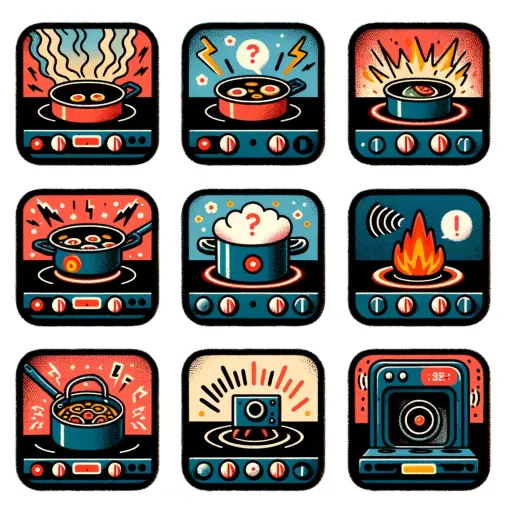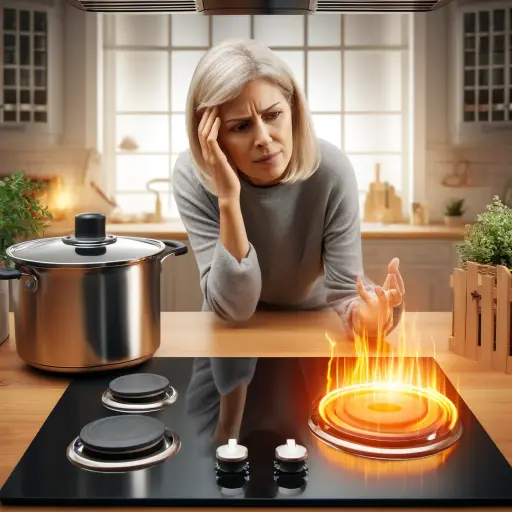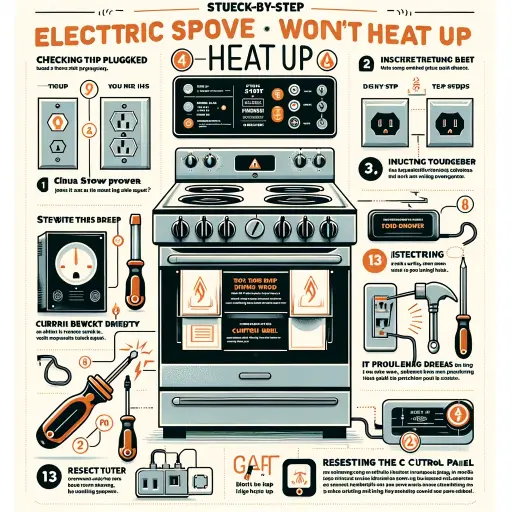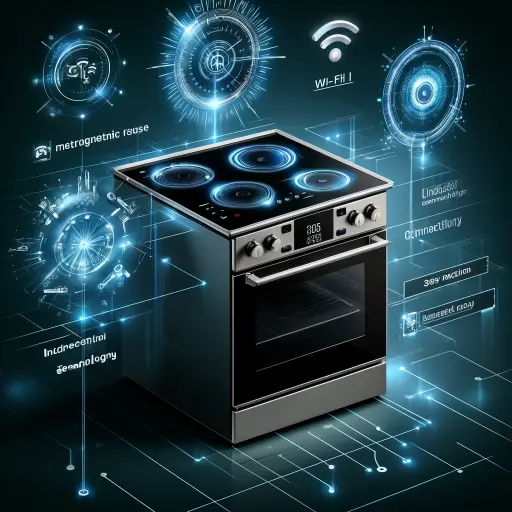Fix Common Electric Stove problems: Expert Tips & Solutions
Updated: 7 Aug 2024
483
Have you ever wondered why your electric stove isn’t performing as expected? Despite being a staple in modern kitchens, electric stoves are not without their issues. From burners that won’t heat to unexpected shutdowns, the frustration can be overwhelming. In this post, you’ll learn how to diagnose and fix the most common electric stove problems, ensuring your kitchen’s heart stays in top shape.
Prevention is better than cure,” goes the old saying, and this is especially true for your electric stove. We’ll guide you through simple steps to tackle typical problems and help you prevent major repairs before they become necessary.

Whether your stove heats unevenly, the burners won’t turn on, or the control panel doesn’t respond, it’s important to know these issues. Keep reading as we break down each problem, giving you practical solutions to keep your stove working well and safely.
Overview of Electric Stove Technology
Understanding the basic design and working principles of electric stoves is crucial for maintaining them effectively. Here, we’ll discuss how these appliances work.
Basic Design and Working Principle
An electric stove converts electrical energy into heat to cook food, a process that is both efficient and quick. The stove typically consists of a steel, glass, or ceramic top with heating elements located beneath the surface. When you turn on the stove, electricity flows through these elements, causing them to heat up due to electrical resistance. The heat is then transferred to the cookware placed on top of the stove.

Common Components That Encounter Issues
Burners: Burners can fail to heat if there’s a problem with the connection or if the heating element has burnt out. They can also suffer from uneven heating, which can lead to poorly cooked food.
Heating Elements: These elements turn electricity into heat. Over time, they can wear out or break, particularly if the stove is frequently used at high temperatures.
Controls: The control panel allows you to regulate the temperature of the burners. Issues here can include knobs that don’t turn, buttons that stick, or digital displays that malfunction.
7 Common Electric Stove Problems
Catching the electric stove issues early can save time and money on repairs. Here’s what to look out for:

Uneven Heating
If you notice that your food isn’t cooking evenly, it might mean there’s a problem with the heating element. For example, one part of the burner could be hotter than another, leading to unevenly cooked meals. This is a clear sign that your stove’s element might not be functioning correctly.
Burner Not Working
A burner that won’t turn on is a common issue. This could be because of a faulty heating element, problems with the control panel, or even a tripped circuit breaker. If one burner doesn’t work while others do, it’s likely a specific issue with that burner.
Strange Noises
Hearing unusual noises like clicking, buzzing, or humming from your stove is not a good sign. These sounds can indicate that something inside the stove is loose, faulty, or possibly overheating.
Unresponsive Control Panel
If buttons or knobs on your control panel aren’t responding, it could mean there are issues within the control panel itself. This might require repairs or a replacement to get your stove functioning properly again.
Slow Heating
When your stove takes a long time to heat up, it could be due to a failing heating element or problems with the thermostat or control board. This means your stove isn’t operating as efficiently as it should be.
Overheating
If your stove gets too hot, it could be due to a thermostat failure or a short circuit. The thermostat controls the temperature, and if it’s not working right, your stove might heat up more than it should. A short circuit can also cause overheating.
Safety Concerns (Accidental Starts)
Electric stoves can sometimes turn on by accident. This can happen if the knobs are bumped or if there’s a fault in the stove’s controls. Accidental starts are safety risk because they can lead to burns or start a fire or electric stove explosion, if something flammable is left on the stove.
Effective Fixes for Common Electric Stove Issues
Electric Stove Won’t Heat Up at All
- Make sure the stove is plugged in properly, and the electrical outlet is functioning. Sometimes, the issue might be as simple as a loose plug on the outlet.
- Circuit breakers can trip due to overload or a short circuit. Check your home’s electrical panel and reset the circuit breaker assigned to the stove if it has tripped.
- The control panel regulates the power sent to the burners. If the stove still doesn’t work after checking the power source and circuit breaker, the control panel might be defective and need professional assessment.

Electric Stove Not Heating Evenly
- Always use flat-bottomed cookware for even heating. Curved pans don’t make full contact with the burner, leading to uneven cooking.
- A physically damaged element can lead to uneven heating. Inspect and replace it if necessary.
- The control board regulates the power supplied to each burner. If it’s malfunctioning, it might supply uneven power, which could cause uneven heating. This situation typically requires professional repair.
Electric Burner Not Working
- Over time, the heating elements can fail. Inspect the element for any signs of damage like burn marks or discoloration. If damaged, it should be replaced.
- Check connections at the burner element and control panel for looseness. A loose connection can prevent the element from heating.
- Each burner is controlled by its own switch. If one burner isn’t working while others are, its control switch might be defective and need replacing.
Electric Stove Clicking Noise
- Electric stoves often make clicking sounds when turned on as the heating elements expand and the relays in the control system operate. This is usually normal.
- Similar to the issue with a burner not working, a loose connection can also cause clicking sounds. Ensure all connections are tight.
- If the clicking is frequent and occurs with issues in temperature regulation, the thermostat controlling the heating elements might be faulty and require professional service.
Electric Stove Control Panel Not Working
- Clean any spills, grease, or debris off the control panel. Sometimes, build-ups can interfere with the buttons’ functionality.
- If the control panel is clean but some buttons still don’t respond, the control board behind the panel might be defective and need replacing.
Electric Stove Slow Heating
- If your stove heats up slower than usual, the heating elements or the thermostat might be deteriorating.
- Replacing these parts can restore the normal heating speed of your stove, making it more efficient and reliable.
Electric stove Overheating
- Overheating can be dangerous and is often due to a faulty thermostat that doesn’t regulate the electric stove’s temperature properly. It’s crucial to address this problem quickly to avoid potential hazards.
- A professional can replace the faulty thermostat or fix any short circuits, ensuring your stove operates safely at the correct temperatures.
Electric stove Safety Concerns (Accidental Starts)
- To prevent accidental starts, make sure your stove has safety feature (Click here for electric stove safety guidelines) like knob covers or a lock-out function, which prevent the controls from being turned on unintentionally.
- If your stove doesn’t have these features, you can buy knob covers from most home appliance stores to add an extra layer of safety.
- Regular checks and maintenance of electric stove’s control mechanisms can also help ensure everything is working properly and safely.
Electric Stove Maintenance Problems
Here are some maintenance tips for electric stoves to prevent common problems:-
Regular cleaning
Wipe down the stove top after each use to prevent buildup of grease and food particles. For coil burners, remove and clean them periodically with a degreasing agent to remove food and grease build-up. Clean the oven interior regularly to prevent excessive smoke and burning during baking for safety.
Check connections
Periodically check the connections of the heating elements and tighten them if loose, as this can affect stove performance and safety.
Professional inspections
Examine the electric stove and have a qualified technician inspect the stove annually, especially the internal wiring and connections, to ensure everything is in good working condition.
You can also find maintenance tips of electric stoves on https://stovemastery.com/how-to-maintain-and-clean-your-electric-stove/
Clarifying Confusions in Electric Stove Troubleshooting
We’re exploring lesser-known issues with electric stoves, given below:
Digital Control Malfunctions
- Unplugging the stove briefly can resolve minor software defects.
- Check for updates that enhance functionality through the manufacturer’s website.
- If issues remain, consider replacing the faulty control board, which may require professional stove installation.

Sensor Issues
- Replace damaged sensors that cause incorrect heating.
- Ensure connections are secure and clean to avoid faulty readings.
Solutions
- Consult the stove’s manual for troubleshooting specific error codes.
- For unique or ongoing problems, contact manufacturer support for potential solution.
Quick Solutions
Here’s a structured comparison table that outlines the common problems with electric stoves along with their potential solutions:-
| Electric Stove Problems | Potential Solutions |
|---|---|
| Uneven Heating | Replace faulty heating elements to ensure even cooking. |
| Burner Not Working | Check power sources and replace defective parts like elements or connectors. |
| Strange Noises | Turn off and unplug stove, then check for loose parts or electrical issues. |
| Slow Heating | Replace aging elements or thermostats to improve efficiency. |
| Unresponsive Control Panel | Reset power or repair/replace the control panel as needed. |
| Overheating | Install a new thermostat or repair short circuits for safety. |
| Maintenance and Longevity Issues | Regular cleaning and professional check ups to prevent wear. |
| Safety Concerns (e.g., Accidental Starts) | Install knob covers or lock out features to prevent unintended use. |
| Difficulties in Troubleshooting | Use the manual for guidance or seek professional technical support. |
Latest Innovations and Technological Advancements
Induction Technology
Modern electric stoves increasingly incorporate induction cooking, which uses electromagnetic fields to directly heat pots and pans without heating the stove surface. This results in faster cooking times and improved energy efficiency.
Smart Connectivity
Many new models feature Wi-Fi or Bluetooth connectivity, allowing users to control their stoves via smartphone apps. These features can include remote monitoring and adjustments.

Improved Temperature Control
Advances in sensor technology and digital controls have allowed for more precise temperature settings, helping users cook more consistently.
Self-Cleaning Technology
Some electric stoves now come with pyrolytic cleaning functions, which heat the oven to a very high temperature to turn food residue into ash, which can then be easily wiped away, reducing the need for cleaners and manual scrubbing.
Safety Enhancements
Innovations such as automatic shut-off features, child lock controls, and overheating protections enhance safety, particularly in households with children or elderly residents.
How latest advancements can reduce common problems
- Induction technology can prevent issues related to uneven heating and reduce the risk of burns.
- Induction cooktops are more energy-efficient as they reduce heat loss by heating only the cookware and its contents.
- Users can control stove functions remotely, adjusting settings via smartphones or other devices, which adds convenience.
- Enhanced temperature control and safety features reduce the risk of overheating and related electrical problems, extending the appliance’s lifespan.
- Improved temperature controls allow for precise heat settings, which is crucial overall cooking results.
Conclusion
Solving common problems with your electric stove starts with figuring out what’s wrong and fixing it quickly. Whether it’s issues with heating evenly, burners not working right, or problems with the controls, fixing these quickly can help save you money and keep your stove working well.
Remember, taking care of your stove regularly and fixing problems right away can help it last longer and work better. If the problems are too tricky to fix on your own, it’s a good idea to call a professional electrician. You can also Decide, whether to fix your old stove or buy a new one is important for keeping your cooking enjoyable and your bills low in the long run.
References
https://www.smartappliance.co.za/2022/11/16/stove-safety-precautions
https://www.constellation.com/guides/appliances/energy-efficient-ovens-stoves.html
Commonly Asked Questions
1. How can I fix a burner that stays hot, even after being turned off?
This could indicate a faulty switch or defected control board. It’s advisable to disconnect the stove from power and contact a qualified technician to replace the faulty component.
2. Why is there sparking from my electric stove?
Sparks can be caused by loose connections, short circuits, or debris on the burners. Turn off the stove immediately and consult a technician.
3. What causes an electric stove to produce a burning smell?
A burning smell can be due to food residues, packaging materials left on the burner, or electrical issues. Clean the surface thoroughly and if the smell remains, it might be an electrical fault requiring professional check up.
Please Write Your Comments